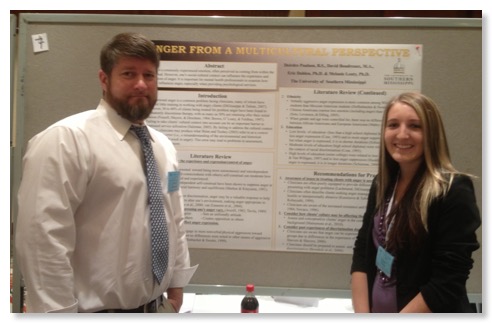
Director: Eric R. Dahlen, Ph.D.
Riley Davis Defends Dissertation
03/04/22 About
Riley Davis, an advanced doctoral student in her final year before internship, successfully defended her dissertation this week. Riley was an active member of Dr. Ashley Batastini’s Correctional & Forensic Psychology Lab before Dr. Batastini took a position at the University of Memphis, and Dr. Batastini has continued to supervise Riley’s dissertation work. Riley’s dissertation, “Race, risk, and confinement: An examination of offender race on post-conviction placement and mandated treatment decisions within the context of an actuarial violence risk assessment,” was an ambitious study on which Riley did an outstanding job. After finalizing her dissertation for submission to the Graduate School, Riley is looking forward to submitting it for publication.
Congratulations to Riley on an impressive defense and on completing this important milestone!
Congratulations to Riley on an impressive defense and on completing this important milestone!
Riley Davis Proposes Dissertation
12/14/20 About

Riley’s dissertation will build on her master’s thesis and aims to extend the literature on how race may influence legal decisions involving post-conviction placement and perceived risk based on information about dangerousness.
Congratulations to Riley on her successful dissertation proposal!
Daniel Deason Defends Dissertation
11/11/16 Aggression

Although the literature on relational aggression among emerging adults has advanced considerably over the last couple decades, surprisingly little is known about the role of culture in general and the nature of relational aggression among LGBT persons in particular. Daniel's dissertation, Hypermasculine, antifeminine: The role of masculine identity in relational aggression among gay men, examined relational aggression and victimization among gay men using Exclusively Masculine Identity Theory (EMIT; Killanski, 2003). Daniel's study utilized structural equation modeling to test models derived from EMIT in an effort to learn more about the possible role of adherence to masculine ideology and sex stereotypically.
The men who participated in Daniel's study differed from those described in some of the previously published research in terms of the masculine and feminine traits they considered desirable. Contrary to what we expected, participants with an exclusively masculine identity (i.e., those who had a more masculine ideal self and a more feminine undesired self) reported lower rates of relational aggression. Thus, while EMIT was useful in predicting relational aggression, the direction of the relationship was not what was anticipated. Daniel's results also suggest that certain domains of masculine ideology may be more useful in predicting relational aggression and victimization than the full EMIT model.
Daniel is currently completing his predoctoral internship at the University of Memphis Counseling Center in Memphis, TN.
Congratulations, Daniel!
Daniel Deason Proposes Dissertation
09/26/15 Aggression
Daniel Deason, an advanced doctoral student who will be applying for a predoctoral internship this year, successfully proposed his dissertation yesterday. He will soon be able to begin his data collection.
Despite evidence that relationally aggressive behaviors can cause problems for emerging adults, little is known about the nature of relational aggression among persons who identify as lesbian, gay, bisexual, or transgender (LGBT). Daniel's dissertation, Hypermasculine, antifeminine: The role of masculine identity in relational aggression among gay men, will examine relational aggression and victimization in the peer relationships of gay men using Exclusively Masculine Identity Theory (EMIT; Kilianski, 2003). Specifically, he aims to test a model derived from EMIT in which adherence to masculine ideology is examined as a potential moderator of the predicted relationship between an index of participants' sex stereotypically and their report of relational aggression and victimization.
Congratulations to Daniel on presenting a complex proposal so clearly!
Despite evidence that relationally aggressive behaviors can cause problems for emerging adults, little is known about the nature of relational aggression among persons who identify as lesbian, gay, bisexual, or transgender (LGBT). Daniel's dissertation, Hypermasculine, antifeminine: The role of masculine identity in relational aggression among gay men, will examine relational aggression and victimization in the peer relationships of gay men using Exclusively Masculine Identity Theory (EMIT; Kilianski, 2003). Specifically, he aims to test a model derived from EMIT in which adherence to masculine ideology is examined as a potential moderator of the predicted relationship between an index of participants' sex stereotypically and their report of relational aggression and victimization.
Congratulations to Daniel on presenting a complex proposal so clearly!
Anger and Culture at SEPA
03/18/13 Anger

Here are David Boudreaux and Deirdre Paulson at the 2013 Southeastern Psychological Association (SEPA) conference in Atlanta with their poster, Anger From a Multicultural Perspective. Deirdre works on Dr. Melanie Leuty's Work & Occupations Research Collaboration Team. This poster was a great example of productive collaboration across different research labs in our program.
Kate Defends Dissertation on Regional Differences in Relational Aggression
10/19/11 Aggression
Kate Czar successfully defended her dissertation yesterday. Her study, Regional Differences in Relational Aggression: The Role of Culture, compared college students from two regions of the U.S. (one northern and one southern) on relational aggression, gender role attitudes, and normative beliefs about aggression. Southern participants were more likely to report engaging in relationally aggressive behaviors and endorsed more traditional gender roles than did northern participants. Apart from the regional differences, gender role attitudes were associated with relational aggression in that participants holding more traditional gender role attitudes were more likely to report behaving in relationally aggressive ways. Independent of physical aggressiveness, gender role attitudes predicted relational aggression among women.
Congratulations to Kate on an excellent defense!
Congratulations to Kate on an excellent defense!
